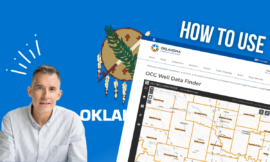In this episode, we delve into the common mistakes made by mineral and royalty owners over the life of owning these types of assets. From not knowing what you own to common legal, financial, tax and other mistakes, we highlight ways to avoid these mistakes and the types of advisors that can help you avoid these and other pitfalls in the future.
Be sure to also subscribe on Apple Podcasts via the link above and please leave us an honest rating and review. We read every one of them and sincerely appreciate any feedback you have. To ask us a question to be featured on an upcoming episode, please leave a comment below or send an email to feedback@mineralrightspodcast.com.
Mistake #1: Not Knowing What You Own
One of the most common mineral owner mistakes is not knowing what you own. It is important to stay up-to-date with drilling activity and permits to maximize the potential of mineral and royalty assets. Mineral owners should keep tabs on new permits and drilling activity in their area to be aware of potential opportunities for leasing or selling their assets. You can’t do these things if you don’t know what you own in the first place.
For example, if you don’t have a good handle on the net interest that you own and if you are looking to sell less than 100% of your interests, if you are not careful, you could inadvertently end up selling more than you have and the Duhig rule will kick in.
The Duhig rule is a rule of title interpretation that resulted from the case Duhig v Peavey-Moore Lumber Company which was decided in Texas in 1940. That case dealt with over-conveyance of fractional mineral interest by prioritizing granted mineral interest over the reserved mineral interest. It comes into play when a mineral owner owns less than 100% of the property conveyed by a Warranty Deed, and reserves a fractional interest. When the deed isn’t drafted properly it is possible that you end up conveying more than intended in order to make the grantee whole.
Most states follow the Duhig rule so it is important to have an attorney review the deed to make sure you won’t be putting yourself in the situation where you end up selling more than you originally intended.
Mistake #2: Not Getting Legal Help
Which brings us to the next common mineral owner mistake – not getting help from an attorney. There are several key milestones where it is important to get help from a qualified attorney such as when negotiating an oil and gas lease or when selling some or all of your interests,
Not hiring an attorney to help negotiate an oil and gas lease could lead to potential pitfalls if not done right. For example, by not negotiating for a higher royalty rate, no post-production costs, a pugh clause, or limiting warranty language, you could be leaving money on the table.
Additionally, when selling minerals or royalties, you will be approached to sign a purchase and sale agreement and a deed. If you are not careful, you could end up selling more than intended (see the Duhig Rule above). For example, you may have a significant amount of royalties being held in suspense by the operator due to a title issue. If you are not aware of this and the deed is structured a certain way, you could be handing over this additional sum of money without getting fairly compensated by the buyer. An attorney can help you understand what is contained in these documents before you sign them.
Mistake #3: Not Knowing the Value of Your Interests
Mineral owners may need an appraisal to understand the value of their minerals, particularly if they have a significant estate and need to know whether they will be within the estate tax limit. However, for those who plan to hold onto their minerals for the long term and pass them down to future generations, a professional appraisal may only be necessary if you are thinking about selling.
You may also have heard that you can use a simple multiple of monthly cash flow to come up with the value of your mineral interests. It is important to be aware of the potential pitfalls of relying on rules of thumb for valuing minerals. These rules of thumb, such as valuing minerals based on lease bonus or monthly royalty payments, can be inaccurate and may not take into account factors such as undeveloped acreage or variations in oil and gas prices. Also, if you are overly optimistic about commodity prices or development timing, this can lead to an unrealistic expectation on value.
If an appraisal is needed, it is important to ensure that it is done by someone familiar with oil and gas valuation methodology, such as a geologist or engineer. This ensures that the appraisal is accurate and takes into account all relevant factors. To learn more about how oil & gas interests are valued, be sure to listen to Episode 194.
Overall, the episode stresses the importance of mineral owners being informed and seeking out trusted advisors, such as attorneys and tax professionals, to help navigate the legal and financial complexities of owning mineral and royalty assets. By staying informed and seeking out knowledgeable professionals, mineral owners can avoid costly errors and maximize the potential of their assets.
Mistake #4: Not Keeping Track of Your Interests
When it comes to managing mineral rights and royalties, there are several key factors to consider. One of the most important aspects is proper documentation. Mineral owners should ensure that they keep their documents organized and maintain proper documentation, including contracts, leases, and royalty statements. Additionally, they should be aware of industry regulations and market conditions, as this knowledge can help them make informed decisions about their assets.
To stay informed, mineral owners should also be familiar with their state oil and gas commission website. It’s important to periodically check for new permits and drilling activity in the area, as this can provide insight into potential opportunities for leasing or selling assets. Mineral owners should also review royalty payments for accuracy, as errors can be costly. By proactively managing their assets and staying informed, mineral owners can maximize the potential of their investments.
For larger estates or holdings, hiring a mineral manager can be particularly helpful. Mineral managers have a network of professionals and resources to take necessary actions, such as hiring an appraiser or negotiating a lease. Software tools like MineraliQ (disclaimer: they are a sponsor of this show, but I use it to manage my royalties) and Pops Royalty software can also assist with tracking royalty payments and flagging discrepancies, which can help to streamline the process of making sure you are getting paid what you deserve.
Mistake #5: Not Understanding How Minerals and Royalties are Taxed
For mineral owners, common mistakes include not understanding how mineral assets are taxed and not being proactive in managing tax liability. Since income tax is not typically withheld from royalty checks, if you are receiving significant monthly income from these interests you should work with your CPA to determine how much to set aside for income taxes. You may need to make estimated tax payments as well in order to not get hit with interest or penalties when you file your tax return.
Also, if you are receiving royalties, your CPA can advise you on the depletion deduction which allows you to deduct 15% from your gross royalty payments when calculating your tax liability. Other potential tax mistakes include not getting an appraisal to establish a step up in cost basis for inherited mineral rights or not using a 1031 exchange to defer capital gains when reinvesting into another qualifying investment property. Finally, mineral owners should also consider the business entity or structure that makes sense for holding minerals from a tax perspective.
Summary
I hope these valuable insights can help you avoid the common mistakes made by mineral and royalty owners. By taking a proactive approach to managing your assets such as seeking out trusted advisors, and staying informed, you can maximize the potential of your assets and avoid costly mistakes.
Resources Mentioned in this Episode
- MRP 6: How to Negotiate an Oil and Gas Lease
- MRP 4: How Mineral Rights are Valued
- MRP 194: How Do You Calculate Mineral Rights Value?
- MRP 84: The Top 6 Things That Affect The Value of Mineral Rights and Royalties
- MRP 123: How to Hire a Mineral Manager
- MRP 180: Practical Tips With Landman and Mineral Manager Jimmy Wright
- MRP 146: How Mineral Rights and Royalties are Taxed in 2022
- MRP 54: Using a 1031 Exchange to Defer Capital Gains Tax
- MRP 66: Dormant Mineral Rights. Do Mineral Rights Expire?
Thanks for Listening!
To share your thoughts:
- Leave a comment or question below (we read each one and your question may be featured in a future episode)!
- Ask a question or leave us feedback via email.
To help out the show:
Click the Apple Podcasts Logo Above to leave us a rating & review. It really helps us reach those that need to hear this information and only takes a minute. We greatly appreciate it! Plus, you can get a shout out on a future episode!
Thanks again – until next time!




